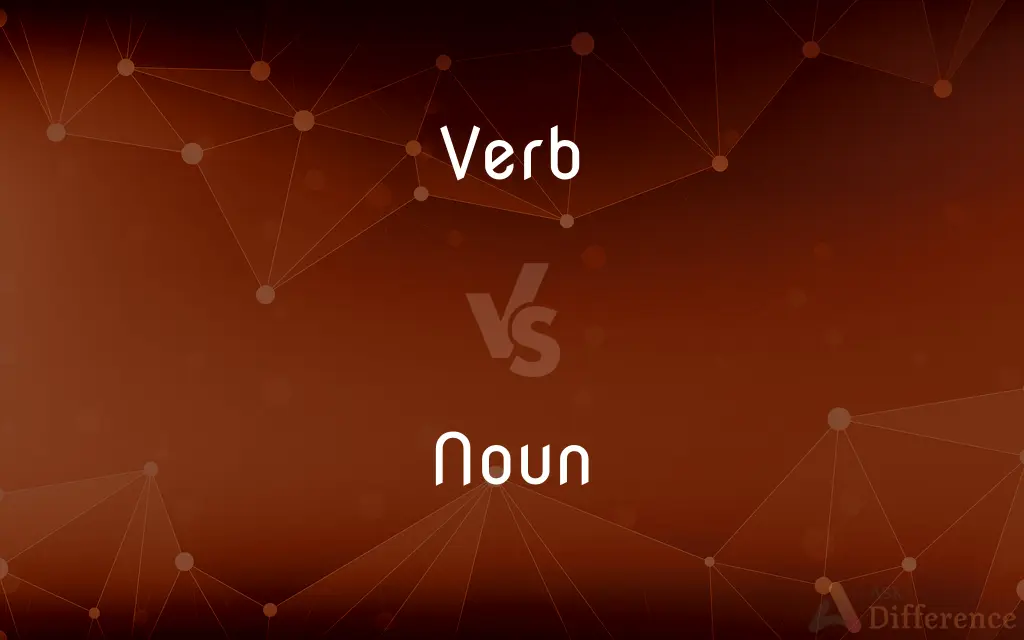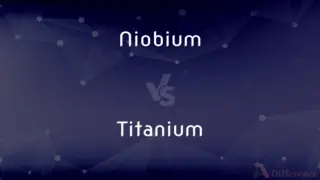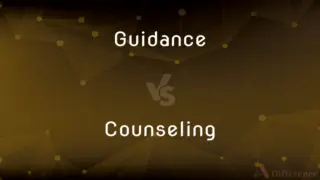Verb vs. Noun — What's the Difference?
By Tayyaba Rehman — Updated on September 15, 2023
A verb denotes an action or state of being, while a noun refers to a person, place, thing, or idea. Essentially, verbs showcase actions or conditions, whereas nouns identify entities.

Difference Between Verb and Noun
Table of Contents
ADVERTISEMENT
Key Differences
In the realm of grammar, verb and noun stand as two of the fundamental pillars. A verb, by definition, communicates an action, occurrence, or state of being. It breathes life into sentences by indicating what is being done or what state is prevailing. For instance, in the phrase "She dances," "dances" is the verb signifying the action taking place.
On the other side, a noun functions as a naming word. It identifies people, places, things, or ideas. With nouns, we can specify subjects, objects, or complement other elements in the structure of sentences. For example, in "The cat sleeps," "cat" is the noun pointing to the subject performing the action.
While a verb exemplifies the dynamic components of language, illustrating movement or change, a noun establishes the static elements, offering names to entities or concepts. To comprehend this, consider the statement "Birds fly." Here, "Birds" (noun) denotes the entities, and "fly" (verb) describes their action.
It's important to recognize that while verbs convey what's transpiring, nouns provide the context or the entities involved. For instance, "Teachers educate." In this, "Teachers" (noun) gives us the entity, while "educate" (verb) offers the action they undertake.
In summation, the interplay between verb and noun is vital for the construction of meaningful sentences. While verbs bring forth actions or states, nouns introduce the entities that participate or exist in those states.
ADVERTISEMENT
Comparison Chart
Definition
Describes an action, occurrence, or state of being.
Names a person, place, thing, or idea.
Function in Sentence
Indicates what is happening or the state that exists.
Identifies subjects, objects, or complements.
Example
Jump, think, be.
Dog, city, love.
Modification
Often modified by adverbs.
Often modified by adjectives.
Form Variation
Can have tenses (e.g., jump, jumped, jumping).
Can be singular or plural (e.g., book, books).
Compare with Definitions
Verb
The component of a sentence that conveys what's occurring.
Birds sing beautifully.
Noun
A naming word for entities or concepts.
The book is on the table.
Verb
A word that can undergo tense changes.
They played soccer yesterday.
Noun
Classifies people, places, things, or ideas.
Love is a powerful emotion.
Verb
Indicates the doings or conditions of the subject.
He is a kind person.
Noun
The primary subject or object in a sentence.
The sun is shining brightly.
Verb
A word that depicts action or state.
She runs every morning.
Noun
Offers context or identity in a sentence.
The girl is reading a magazine.
Verb
Describes the movement, thought, or condition in a statement.
I think he is right.
Noun
A noun (from Latin nōmen 'name') is a word that functions as the name of a specific object or set of objects, such as living creatures, places, actions, qualities, states of existence, or ideas. However, noun is not a semantic category, so it cannot be characterized in terms of its meaning.
Verb
A verb (from Latin verbum 'word') is a word (part of speech) that in syntax conveys an action (bring, read, walk, run, learn), an occurrence (happen, become), or a state of being (be, exist, stand). In the usual description of English, the basic form, with or without the particle to, is the infinitive.
Noun
A word (other than a pronoun) used to identify any of a class of people, places, or things (common noun), or to name a particular one of these (proper noun).
Verb
A word used to describe an action, state, or occurrence, and forming the main part of the predicate of a sentence, such as hear, become, happen.
Noun
The part of speech that is used to name a person, place, thing, quality, or action and can function as the subject or object of a verb, the object of a preposition, or an appositive.
Verb
Use (a word that is not conventionally used as a verb, typically a noun) as a verb
Any English noun can be verbed, but some are more resistant than others
Noun
Any of the words belonging to this part of speech, such as neighbor, window, happiness, or negotiation.
Verb
The part of speech that expresses existence, action, or occurrence in most languages.
Noun
A word that functions as the name of a specific object or set of objects, such as person, animal, place, thing, phenomenon, substance, quality, or idea; one of the basic parts of speech in many languages, including English.
Verb
Any of the words belonging to this part of speech, as be, run, or conceive.
Noun
Either a word that can be used to refer to a person, animal, place, thing, phenomenon, substance, quality or idea, or a word that modifies or describes a previous word or its referent; a substantive or adjective, sometimes also including other parts of speech such as numeral or pronoun.
Verb
A phrase or other construction used as a verb.
Noun
(computing) An object within a user interface to which a certain action or transformation (i.e., verb) is applied.
Verb
(grammar) A word that indicates an action, event, or state of being.
The word “speak” is an English verb.
Noun
(transitive) To convert a word to a noun.
Verb
(obsolete) Any word; a vocable.
Noun
A word used as the designation or appellation of a creature or thing, existing in fact or in thought; a substantive.
Verb
(figurative) An action as opposed to a trait or thing.
Kindness is a verb, not an adjective. You're only kind if you do kind things.
Noun
A word that can be used to refer to a person or place or thing
Verb
(programming) A named command that performs a specific operation on an object.
Noun
A word that can serve as the subject or object of a verb
Verb
To use any word that is or was not a verb (especially a noun) as if it were a verb.
Noun
Can be tangible or intangible entities.
Freedom is a cherished value.
Verb
To perform any action that is normally expressed by a verb.
Verb
A word; a vocable.
Verb
A word which affirms or predicates something of some person or thing; a part of speech expressing being, action, or the suffering of action.
Verb
A word that serves as the predicate of a sentence
Verb
A content word that denotes an action or a state
Common Curiosities
What primary role does a verb play in a sentence?
A verb indicates action, occurrence, or state of being.
How does a noun function in language?
A noun names or identifies a person, place, thing, or idea.
How are nouns typically modified?
Nouns are usually modified by adjectives.
Can a word be both a verb and a noun?
Yes, some words can function as both, e.g., "drink" (a drink, to drink).
Can nouns depict actions?
No, nouns name entities; verbs depict actions.
How are verbs typically modified?
Verbs are often modified by adverbs.
What are collective nouns?
Collective nouns name groups, like "team" or "flock."
Do all verbs indicate action?
No, some verbs, like "is" or "seems," indicate a state or condition.
What's the difference between a main verb and a helping verb?
A main verb carries the primary action or state, while a helping verb supports it, e.g., "is running."
Can a verb exist without a noun in a sentence?
While often verbs pair with nouns, imperatives like "Run!" have implied subjects.
Can nouns be abstract?
Yes, nouns like "freedom" or "beauty" represent concepts and are abstract.
What's a compound noun?
A compound noun is made of two or more words, like "toothbrush."
Can a single noun be both singular and plural?
Some nouns, like "sheep," have the same form in both singular and plural.
What forms can verbs take based on tense?
Verbs can be in past, present, or future forms, like "ran," "run," "will run."
How do action verbs differ from linking verbs?
Action verbs depict activities, while linking verbs connect the subject to its description.
Share Your Discovery

Previous Comparison
Niobium vs. Titanium
Next Comparison
Guidance vs. CounselingAuthor Spotlight
Written by
Tayyaba RehmanTayyaba Rehman is a distinguished writer, currently serving as a primary contributor to askdifference.com. As a researcher in semantics and etymology, Tayyaba's passion for the complexity of languages and their distinctions has found a perfect home on the platform. Tayyaba delves into the intricacies of language, distinguishing between commonly confused words and phrases, thereby providing clarity for readers worldwide.















































